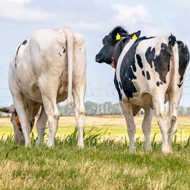Farm vets urge government action on labour shortages

“We need the Government to work with industry to tackle the immediate labour shortage facing the sector" - Elizabeth Berry, BCVA.
The British Cattle Veterinary Association (BCVA) is urging the government to provide better support for the food and farming sector in light of significant labour shortages.
The Association is warning that, if nothing changes, there could be a “devastating” impact on public health and animal welfare.
British farmers have been hit hard in recent years by the falling number of EU registrants coming to work in the UK – a problem highlighted by the Environment Food and Rural Affairs (EFRA) Committee earlier this week.
In its report, EFRA maintains that the government has not adequately addressed the effects of the labour shortages, which “pose real risks of further price rises for consumers in supermarkets, reduced UK competitiveness and increased amounts of imported food.”
Figures published by the RCVS show the annual number of registrants coming to work in the UK decreased by 68 per cent from 1132 in 2019 to just 364 in 2021. Meanwhile, according to data from the APHA, applications for food-related export health certificates rocketed by 1,255 per cent.
BCVA president Dr Elizabeth Berry said the Association is feeling the effects of this both in practice and on clients' farms.
“Our need for farm staff, abattoir workers, vet techs, and vets is increasing – yet our resources are depreciating,” she said. “Farm vets and farmers have worked hard to maintain welfare standards during the massive challenges around Covid.
"We are now committed to meeting the needs of a global food crisis, as well as dealing with the consequences of new export and import requirements – this all requires an appropriately qualified and experienced workforce.”
Dr Berry said that the BCVA welcomed EFRA's call on the government to review their position and urged the Independent Chief Inspector of Borders and Immigration, David Neal, to carry out his pledge to inspect the impact of the current immigration system on the agricultural sector.
“We need the Government to work with industry to tackle the immediate labour shortage facing the sector and to develop a long-term labour strategy that produces enough qualified UK workers to reduce dependence on overseas labour,” she continued.
“Our current situation threatens food security, animal welfare, and the mental health of those working in this sector.”



 The RCVS has announced a new version of its 1CPD mobile app, with enhanced features for veterinary surgeons and veterinary nurses to record their continuing professional development.
The RCVS has announced a new version of its 1CPD mobile app, with enhanced features for veterinary surgeons and veterinary nurses to record their continuing professional development.